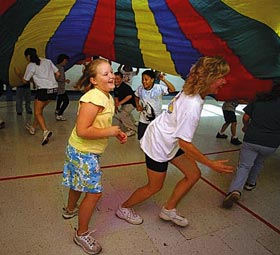For more archives, go to the Advance Archive/Search Page.
Kids in New Program Hop, Skip,
Jump Toward Physical Fitness
Third and fourth graders at a Tolland elementary school are sweating it out with Neag School of Education faculty and students.
As members of the Paw PALS club, 20 students meet before school every morning for eight weeks. The program was launched last spring on an experimental basis by Jaci VanHeest, an associate professor of kinesiology, at the request of Parker Memorial School’s physical education teacher, Lisa Dutton.
Dutton told VanHeest she was seeing too many pounds on her students and not enough energy from them, so she put out a call to the experts in the kinesiology department.
In the absence of funding, the project became a labor of love for VanHeest, who welcomed the opportunity to put her ideas into action.
“If we make children more physically fit, they become better students. Research shows this and we are witnessing this first-hand,” says VanHeest, an exercise physiologist. She enlisted the help of her graduate students and several undergraduates to run the daily activities.
 |
Children at a Tolland elementary school have fun during free play as part of a new program run by Jaci VanHeest, associate professor of kinesiology. |
Photo courtesy of Jim Michaud, Journal Inquirer |
The program has attracted national attention. This week’s Sports Illustrated features Paw PALS in a special report titled “Get Out and Play: How to Get Our Kids Back in Shape.”
Each session starts with the “Parker Speedway,” a warm-up that includes a combination of running, jogging, skipping, walking, and hopping around the gym.
After stretching, the students play several games. Among the favorites: Superman tag and a version of Harry Potter’s Quidditch. Before the kids head off to class, they gather in the middle of the floor and put their hands together for a “1-2-3 Paw PALS” cheer.
“Their faces lit up the first time we ended the session with the cheer,” says VanHeest. “They’d become members of a team and loved it, and now if we attempt to end a session without the chant, the kids quickly remind us.”
That kind of enthusiasm carries over into the classroom. About a week into the program, club members and their teachers began noticing a difference. Students who’d had trouble getting up in the morning were arriving at their first class wide-awake and full of energy.
“Our goal is to show kids how beneficial it can be to become physically fit and how fun free play is,” VanHeest says, “and if some of them lose some weight in the process, great!”
Fun and free play are often not included in standard phys-ed classes. Instead, says VanHeest, the classes are usually focused on developing and measuring skills, and this doesn’t work for self-conscious, overweight students.
“Our program is not remedial physical education,” says VanHeest. “There are no mandated outcomes, no failures, and it’s not intimidating. Instead it’s about getting kids hooked on how much fun it is to be active. You can see it on their faces. Who’s not successful in a game of octopus tag?”
In the beginning, several parents and teachers were concerned that a club for obese kids would stigmatize them, so invitations went out to physically fit kids as well. Soon, dozens of students were asking to join in, but there was space for just 20 students.
“We made it cool to be a Paw PALS member,” says VanHeest, who worked with her group to come up with the club’s title. “Paw” represents the kids’ favorite team – the UConn Huskies – and “PALS” stands for Physical Activity as a Lifetime Skill, the program’s main objective.
The program is proving so successful, VanHeest is looking for funding that would extend Paw PALS to other schools, while also enabling research. Her team hopes to take baseline measurements of each student’s weight, physical performance, and academic performance.
“We can see the difference this club has made in the lives of these children,” she says. “We have to find a way to keep it going.”

